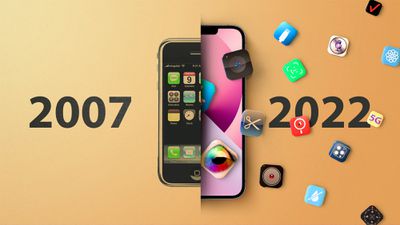Sunday will mark the 15th anniversary of Steve Jobs introducing the original iPhone at the Macworld Expo in San Francisco, and while the device revolutionized the smartphone industry, it's easy to forget how much the iPhone has improved since then.

To celebrate the upcoming occasion, we've put together a list of 15 features the original iPhone didn't have when it was first announced.
- App Store: The original iPhone came with preinstalled apps like Phone, Weather, Notes, Calendar, Photos, and Calculator, but there was no official way to install native third-party apps until the App Store launched in July 2008. Developers were able to offer web-based apps, but this was a subpar experience.
- Copy and Paste: It may seem hard to believe, but the ability to copy and paste text was not added to the iPhone until 2009.
- Front Camera: While selfies are now ubiquitous, there was no front camera on the original iPhone. In fact, there was no front camera until the iPhone 4 launched in 2010 with new FaceTime video calling.
- Video Recording: The original iPhone can only shoot photos, with video recording introduced on the iPhone 3GS in 2009.
- Flashlight: With no LED flash on the original iPhone, there was no built-in flashlight. When the App Store launched, some flashlight apps were released that displayed a white screen at max brightness to mimic a flashlight.
- Photo Messaging (MMS): The original iPhone supported text messaging via SMS, but there was no ability to send photos. MMS capabilities were introduced with iPhone OS 3.0 in 2009, but only for the iPhone 3G and iPhone 3GS.
- GPS: While the original iPhone came with a Google Maps app preinstalled, there were no turn-by-turn directions, as the device did not have a GPS. Apple introduced a built-in GPS with the iPhone 3G in 2008.
- Home Screen Wallpapers: It was not possible to set a custom Home Screen wallpaper on the iPhone until iOS 4 was released in 2010, and the software update did not support the original iPhone.
- Verizon Support: AT&T was the exclusive iPhone carrier in the U.S. until Verizon began supporting the device in 2011.
- Siri: Apple's voice-based digital assistant launched with the iPhone 4S in 2011.
- Touch ID or Face ID: While modern iPhones and iPads are equipped with biometric authentication systems like Face ID or Touch ID, the original iPhone could only be secured with a four-digit passcode. Touch ID arrived with the iPhone 5s in 2013, while Face ID debuted on the iPhone X in 2017.
- Lightning Connector: Like many iPods before it, the original iPhone was equipped with a 30-pin dock connector. Apple switched to the smaller Lightning connector with the release of the iPhone 5 in 2012.
- Retina Display: Introduced on the iPhone 4 in 2010, the Retina display featured four times as many pixels as the original iPhone and was the highest-resolution display for a smartphone ever at the time.
- Wireless Charging: The first iPhones to support wireless charging were the iPhone 8, iPhone 8 Plus, and iPhone X released in 2017.
- Water Resistance: Water did not play friendly with the original iPhone, but the latest models have IP68-rated water resistance.
Looking ahead, the iPhone 14 will get even more new features, so be sure to catch up on everything that we know so far.





















